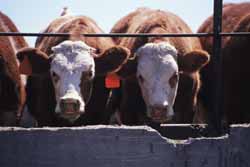
Escherichia coli
What is Escherichia coli?
It is more commonly known as E. coli. E. coli are a part of the
normal intestinal flora of many animals, even humans. Numerous
strains of E.coli have no harmful effects on the host animal, but
enterhaemorrhagic strains may cause infection and produce toxins
that can lead to tragic illness.(1)*

How does one contract E. coli?
E. coli with enterohaemorrhagic strains can sometimes
be found in cattle and sheep feces, which
may contaminate the meat during slaughter.
Humans can transmit E .coli by eating
undercooked meats. Unpastureurized milk and juice
products and salads may be contaminated with E. coli.(2)*
Symptons associated with E. coli food poisoning:
- Severe diarreha
- Blood in stool
- Vomiting
- Fever
- Severe abdominal cramps
*a person with these symptons should see a physician immediately(3)*

Ways to reduce the risk of E. coli food poisoning:
- Cook all beef and hamburger thoroughly
- Ground beef should be cooked at a temperature of 160 degrees F
- Dont eat beef if it is pink in the middle
- Keep raw meat away from ready to eat foods
- Wash hands, utensils and counters with hot water and soap.
- Drink only pastueurized milk, juice and cider
- Wash fruits and vegetables thoroughly (4)*

Current research to cease the spread of E. coli:
- Understanding the ecology of E. coli and
the factors influencing the contamination of food products.
- All stages in the meat packaging process should be sampled.
- Estimating measures needed to minimize contamination
of food that carry these organisms.(5)*
Related sites


 E. coli may affect 1/2 of US cattle
E. coli may affect 1/2 of US cattle
 Encyclopedia of E. coli genes
Encyclopedia of E. coli genes
 E. coli in kids
E. coli in kids
 FDA
FDA
 Texas company recalls ground beef
Texas company recalls ground beef
 Cornell University Study
Cornell University Study